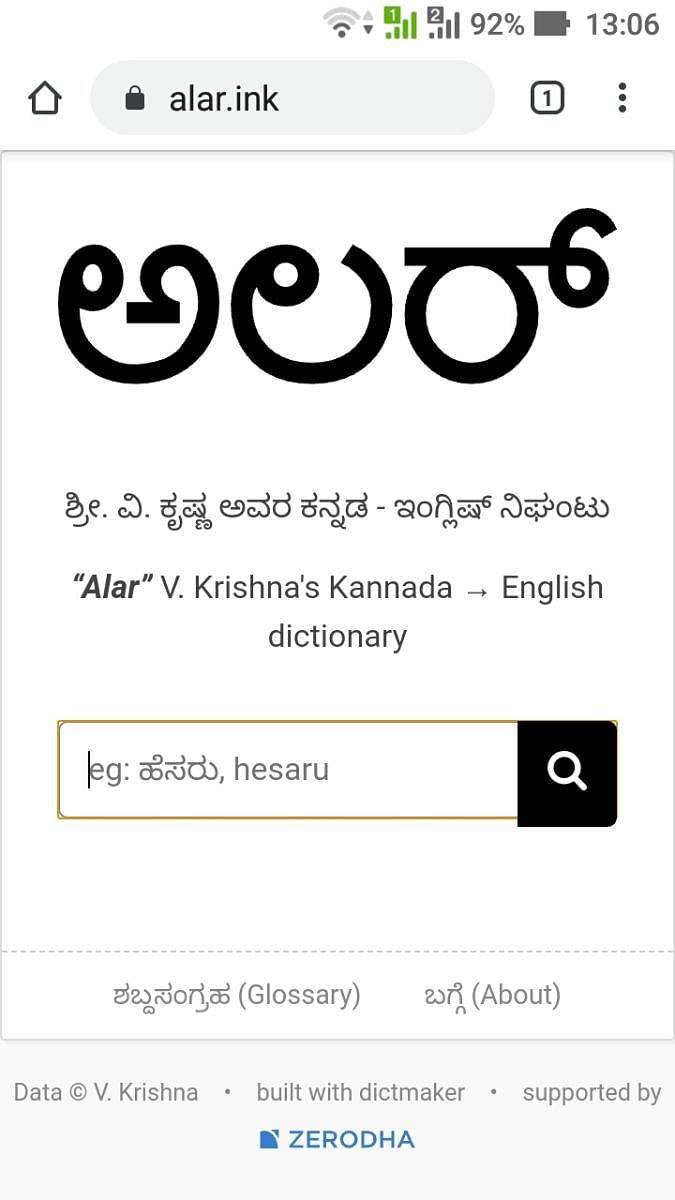
A full 126 years after the publication of German missionary Ferdinand Kittel’s definitive Kannada-English dictionary, a similar, but a more comprehensive one, is out.
While Kittel’s dictionary has about 60,000 words, the Kannada-English lexicon compiled by V Krishna, a lexicographer based in Bengaluru, has about 1.6 lakh words.
Alar, as the new dictionary is called, is an authoritative dictionary with 2.4 lakh English definitions, and is the largest, most authoritative open source dictionary in the world, according to Zerodha, a brokerage firm which has collaborated with Krishna. Alar means bloom in Kannada. In 2018, the Zerodha team discussed the idea with Krishna and awarded him a grant.
Kailash Nadh, chief technology officer of Zerodha, says, “I have been running Olam (Wave), an English-Malayalam and Malayalam-Malayalam dictionary, since 2010. It was built out of the frustration of not having an easily accessible online Malayalam dictionary.”
When he moved from Kerala to Bengaluru in early 2012, he picked up some Kannada.
“I can comprehend Kannada speech reasonably well but speak rather poorly. With the guilt of not being able to learn Kannada, and the great satisfaction of having Olam as an open data corpus, I had been looking for ways to build a Kannada dictionary,” he told Metrolife.
He presented the idea to his company, and it was a happy coincidence that he met V Krishna, who had compiled 1.6 lakh Kannada words over 40 years.
He had appended English definitions, all neatly typed up in Word, with parts of speech tags and phonetic notations.
“Karnataka Sahitya Parishat had published his dictionary running into 4,700 pages. We approached him with our aim,” Kailash Nadh says.
Krishna, worked with the Indian Agricultural Research Institute and Corporate Institutions, had studied in Kannada medium and learnt Kannada and English together.
“I went through dictionaries then. Very soon, I started jotting down notes and began structuring them. It went on for years and years. Later, I came across a Kannada dictionary published by the Kannada Sahitya Parishat and wrote to the editors about the mistakes in it,” he says.
The premier literary organisation took a look at his work then.
He had completed his dictionary in the 1990s, typing it single handedly and neatly in Nudi, a Kannada software format. Just the typing had taken him eight years.
The dictionary was published by Karnataka Sahitya Parishat in 2015. “Now, it is available for all in Unicode format,” he says.
He likes the idea of a free online dictionary because, he says, print has its limitations. The cost of production is higher, distribution is not easy, and copies often run out.
“When technology changes, we have to change too. But books are books. Some people want to read books alone,” he says.
It is not that there is no Kannada dictionary online. “There are some out there for free on the Internet. But they are not comprehensive,” he says.
The ‘Alar’ project is open source, which means anyone can suggest words to add. “Compiling a dictionary is a huge task,” he says.
Access Alar here: https://alar.ink/.